|

|
|

|
The Pullman Porter's Story
|
 |
|
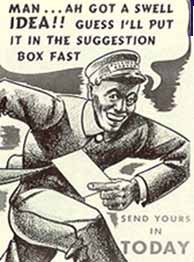
|
"I was able to make a contribution solely because we had the Brotherhood, and I wasn't afraid. And, again,
I have to come back to A. Philip Randolph. The Civil Rights Movement saw to it that black people were able to do
things legally, like ride on a Pullman car, say. But the labor movement saw to it that black people had the money
to buy the ticket to ride on the Pullman cars, see? What good is it to have the right to do something, if you don't
have the money to do it? The labor movement gave black people the opportunity to do things that the civil rights
movement gave the right to do." (55, E.D. Nixon) |
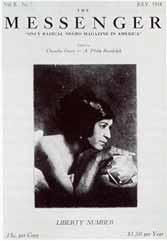 |
|
|
|
|
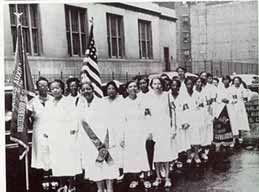
|
In the 1920's the Pullman Company employed more Black workers than any other U.S corporation.
George Pullman had started his Pullman Porter Palace Company right after the civil war and provided a standard
for luxurious travel. Beginning in 1867, George Pullman filled his earliest staff from the genteel servants of
the Plantation south. Working as a Pullman porter offered opportunity for employment, however, the stability of
their employment was always on shaky ground.
|
|
|
The early porters worked graciously receiving passengers, carrying their luggage, making up their
rooms, serving beverages and food, keeping the guests happy and making themselves available at all hours during
the day or night. These men did their job so well they became known as the "Ambassadors of Hospitality.""Seventy
years later, the gratitude had worn thin. the new generation of free-born, more informed porters was not satisfied
with the Pullman Company's long hours, low wages, and unfair company policies. their smiles changed to pleas in
the beginning, then shouts of protest.

|
"We were a handful of Negroes. had nothing: no money, no experience in this. I used to say that all we
had was what God gave the lizard." p. 48
|

Unable to get the powerful Pullman Company to negotiate in good faith, the porters united under the leadership
of A. Philip Randolph, and in 1925, against all odds, they formed the first Black-controlled union: the Brotherhood
of Sleeping Car Porters." (XII) "In 1925 we heard about some man in the East writing about organizing
the Pullman porters into a union. And of course I had been there just long enough to see what the conditions were,
and I had sense enough to know that this guy was on the right track, whoever he was, talking about organizing the
porters into a union. And his name was A. Philip Randolph." (p37, Miles of Smiles. C.L. Dellums.) |
|
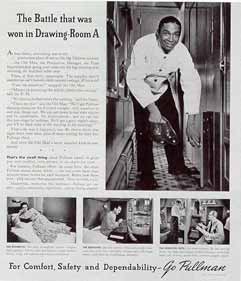
|
On an August night in 1925, 500 porters gathered
at the Elks Lodge on 129th. St. in Harlem and the
Brotherhood of Sleeping Car Porters was born. In that same year the Brotherhood
began organize Pullman sleeping car porters and maids. The goal of the Brotherhood
was to get higher wages and shorter working hours for employees and to get
support away from a union called the employee representation Plan which
was lead by Blacks hand-picked by the Pullman Company. |
|
|
|
|
A.Philip Randolph, the founder of the Brotherhood of Sleeping Car Porters, was the union's national president,
with headquarters in New York City. At that time, Phil Randolph and his two principal lieutenants, William Webster
in Chicago and C.L. Dellums in Oakland, were encountering a multitude of obstacles from porters -- some from fear
of losing their jobs if they joined the union, and from many others out of ignorance.
Before Randolph emerged as the leader of the sleeping car porters in 1925, conditions were deplorable. The hours
were very long, with no overtime. The Pullman Company paid very low wages, and the porters had to depend on the
generosity of the traveling public to increase their income. |
|
In the early days of the union, some workers became stool pigeons. They attended meetings, then went back to the
company and reported what had happened. Randolph was widely heralded for being sent a blank check, signed by the
Pullman Company, and being told to write in his own figure and forget about that union nonsense. Randolph exposed
the American labor movement as one of whites only.
His view was that the crippling effects that racism inflicted on Blacks must go. So his appeal was very broad to
blacks all over the nation. The white union leaders never did lend any support to Phil Randolph when he formed
the union of sleeping car porters. They were very antagonistic toward him. He endured all manner of insults from
the American Federation of Labor before he was able to get an international charter in. |
|
|
|
|
And then came the big fight with the Pullman Company to gain recognition as the bargaining agent for the porters.
It took twelve years before the company would sit down with him and make the agreement. Finally in 1937, the Brotherhood
of Sleeping Car Porters was accepted by the Pullman Company as the official representative for the porters. It
was the first all-Black union to be recognized by a major U.S corporation. |
|
|
In 1978, the Brotherhood of Sleeping Car Porters merged with a larger union, the Brotherhood of Railway and Airline
Clerks, and ceased to exist as an independent organization. Philip Randolph died in 1979 at the age of 90.
|
|
| |
|
|
|
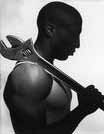
|

|
NEXT
|
| |
|
|











